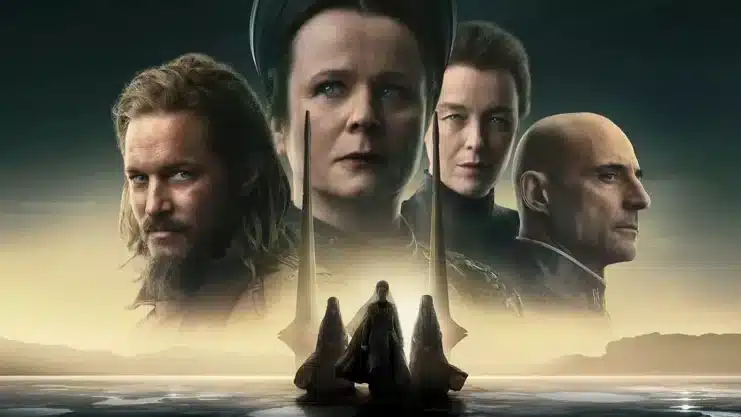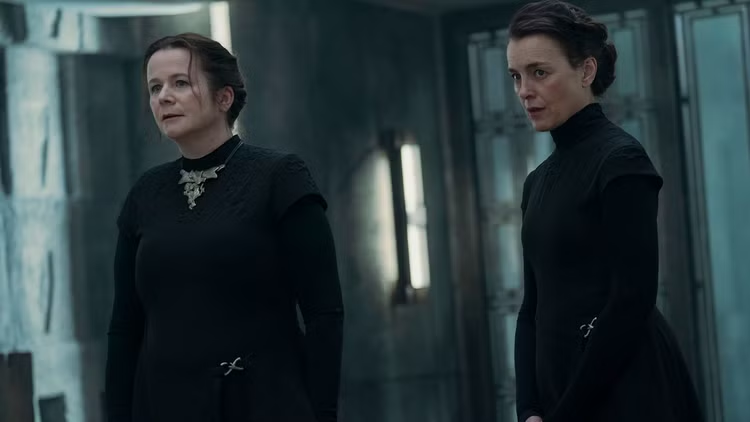
The latest chapter of Dune: Prophecy brings to light some of the secrets of the Harkonnen



The Harkonnens’ troubled past
In episode 3, the series expands on this duality by revealing details about the sisters’ pasts and their struggle to survive in a hostile environment. The Harkonnen were not always the oppressors; There was a time when they were victims of betrayal and injustice. However, this blend of empathy and hatred gave rise to the fatal flaw that defines House Harkonnen: its obsession with revenge.
The narrative of the third episode takes us into the Harkonnen exile on the planet Lankiveil, where Valya and Tula grew up marked by accusations of a war crime that, according to them, their family did not commit. This exile fueled an intergenerational hatred towards House Atreides, which, according to Valya, was responsible for the family’s misfortune.
Griffin, the protagonists’ older brother, attempts to erase the Harkonnen name from his position in the Landsraad, but his sudden death raises suspicions of murder. While it was never confirmed whether Vorian Atreides was the culprit, the perception of betrayal is enough to perpetuate the enmity between the two houses.
The sisters’ fateful decisions
The story takes a tragic turn when Tula, while hiding her true identity, falls in love with Orry, a young man from House Atreides. Despite their genuine bond, Tula can’t overcome the weight of her past. His confession of love ends in blood when he reveals that he killed the rest of Orry’s hunting party, including his family. Although she appears remorseful, her determination to avenge Griffin leads her to end Orry’s life, leaving only a young man named Albert to escape.
This action divides the Harkonnen. While some members condemn Tula’s actions, Valya celebrates her sister’s strength, recruiting her into the organization known as the Brotherhood. This moment highlights how hatred can perpetuate a cycle of violence even among those who could have chosen another path.


The burden of vengeance on the Harkonnen legacy
The obsession with power and revenge is a hallmark of the Harkonnen. While Valya and Tula represent a more nuanced version of this house, their actions inevitably connect them to the more grotesque villains we encounter in Dunelike Baron Vladimir Harkonnen.
Even in the film adaptations of Denis Villeneuve, such as Duna: second partthis thirst for vengeance extends to Paul Atreides, who, after discovering his Harkonnen heritage, embraces ruthless tactics to consolidate his power. Paul’s statement: “We are Harkonnen. This is how we will survive,” reflects how the legacy of this house always finds a way to manifest itself, even in characters who initially seemed destined to break that cycle.
Is the fate of the Harkonnen inevitable?
Still, Dune: Prophecy and Villeneuve’s films leave room for reflection. The resilience of characters like Jessica Atreides, who fights the instinct for revenge, and Tula’s moments of doubt, demonstrate that the Harkonnen are not entirely devoid of morality. However, the series points out that even the most humane decisions can be distorted by resentment and circumstance.


Dune: Prophecy offers an enriching view of one of the most complex houses in the universe of Dune. By exploring Valya and Tula’s past, the series not only expands the mythology of this vast world, but also raises universal questions about the weight of legacy, the capacity for redemption, and the limits of forgiveness.
The new episodes of Dune: Prophecy They air every Sunday on HBO and Max.